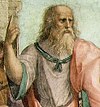Minos (dialogue)
Minos (/ˈmaɪnɒs/ or /ˈmaɪnəs/; Greek: Μίνως) is a dialogue attributed to Plato, featuring Socrates and a Companion. Its authenticity is doubted by W. R. M. Lamb because of its unsatisfying character, though he does consider it a "fairly able and plausible imitation of Plato's early work."[1] Edith Hamilton and Huntington Cairns do not even include it among Plato's spurious works in their Collected Dialogues. Leo Strauss, on the other hand, considered the dialogue to be authentic enough to write a commentary on it.[2]
The dialogue begins with Socrates asking his nameless companion, "What is the law for us?" It then proceeds to examine the nature of law before praising Minos, the mythical king of Crete and an ancient enemy of Athens. Socrates defends an extraordinary definition of law as that which "wishes to be the discovery of what is," as opposed to the companion's more common-sense understanding that law is the decreed "official opinion" of a city. The culminating praise of Minos seems part of Socrates' intention to liberate the companion from loyalty to Athens and its opinions.
Notes
References
- Hamilton, Edith and Cairns, Huntington, ed. (1961). The Collected Dialogues of Plato. Princeton: Princeton University Press.
- Lamb, W. R. M. (1927). Introduction to the Minos. In Plato, Charmides, Alcibiades, Hipparchus, The Lovers, Theages, Minos, Epinomis. Loeb Classical Library. Cambridge, MA: Harvard University Press.
- Strauss, Leo. (1968). On the Minos. In Liberalism Ancient and Modern. Ithaca, NY: Cornell University Press. Pp. 65–75.
External links
- Minos translated by George Burges
- Free public domain audiobook version of Minos translated by George Burges



